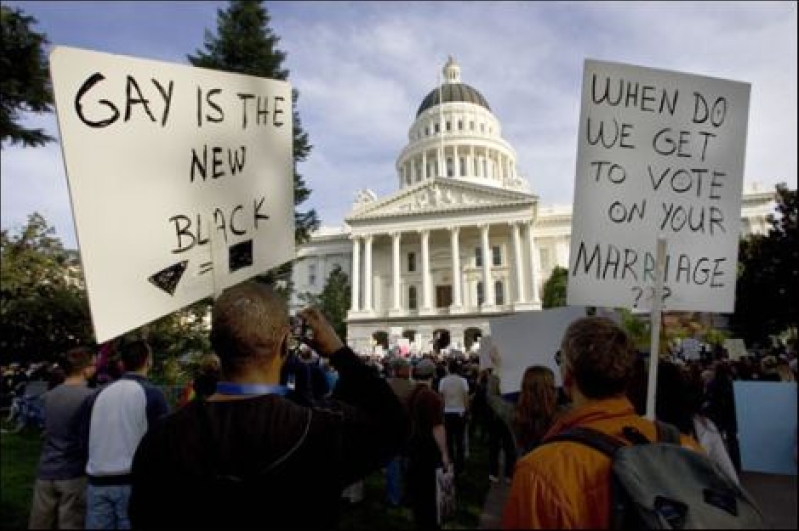
A survey released earlier this week reveals that only 1 in 10 Americans believe small business owners should have the right to refuse service or do business with homosexuals, African-Americans, Jews or atheists based on religious grounds.
The survey, created by the Public Religion Institution, discovered that among the four groups, there was the least support for refusing service to African-Americans, but the most against gay or lesbian individuals, MSNBC reports.
The report included the responses of over 1,000 adults who were interviewed by telephone. Participants were asked if it should be legal to refuse to do business with members of the LGBT community on religious grounds, and 16% said yes and 80% said no. Similarly, 15% said it should be legal to refuse service to atheists, with 81% saying it shouldn't be.
However, the study found less support for religious beliefs being an adequate reason to allow a small business owner to refuse to business to Jewish people, with 12% reported as saying yes and 85% saying no. Most individuals said African-Americans should receive service regardless of the religious beliefs of business owners, with 87% saying they did not support the legal right to refuse service and 10% saying they did.
The poll also discovered that over half of Americans feel "the right of religious liberty is being threatened."
The question of religious vs. governmental rights for small business owners has been hotly debated for the past several decades.
In the 1960's, Bob Jones University argued that its First Amendment protections should allow it to prohibit interracial dating without losing tax benefits. However, the Supreme Court ultimately ruled that "Government has a fundamental, overriding interest in eradicating racial discrimination in education ... which substantially outweighs whatever burden denial of tax benefits places on petitioners' exercise of their religious beliefs."
Today, members of the LGBT community continue to compare civil rights cases to their case for equality. Earlier this year, a Colorado baker Jack Phillips was ordered by the state's Civil Rights Commission to make wedding cakes for gay couples and undergo sensitivity training after being sued for refusing to provide service to the LGBT community based on his religious beliefs.
Judge Robert N. Spencer said Phillip's refusal to "contribute to a gay wedding" based on religious grounding was essentially the same as refusing to provide service to an interracial couple.
"Phillip's argument would allow a business that served all races to nonetheless refuse to serve an interracial couple because of the business owner's bias against interracial marriage."
However, Rev. Stacy Swimp, Founder of the Michigan based Revive Alive Missional Ministry and a Spokesman for a coalition of over 200 Black Michigan Pastors and Christians leaders in outstate Michigan, says comparing the LGBT plight to the Civil Rights Movement is not only historically incorrect, it's offensive to Black Americans who suffered oppression under the Jim Crowe laws.
"It's historically, culturally and biblically illiterate and incorrect to make that kind of comparison," he said.
"There were Jim Crow laws created to keep us segregated from society-there is no instance in any law where LGBT have faced institutional segregation. We were subject to IQ tests in order to vote; no member of the LGBT community can lay claim to being subject to any kind of test in order to exercise voting right. They've had the right to advocate for their agenda, something blacks were never able to experience. We were sold from our families, separated from any memory of our indigenous language, culture and religion. No member of the LGBT community has experienced that. The idea of hijacking the Civil Rights movement and the historical struggle of black Americans is insulting, false, malicious, and absolutely irresponsible.
He continued, "Neither Absalom Jones, Richard Allen , Frederick Douglas, Booker T. Washington, W.E.B. Dubois, Medgar Evers, or Martin Luther King Jr. struggled for the right and federal protection of sexual misconduct. But they all fought, and many lost their lives, for the right of true liberty."






